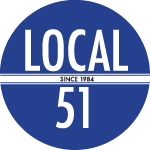With a backdrop of U.S., Canadian and Puerto Rican flags, the 72nd meeting of the Newspaper Guild sector conference opened Friday morning in Toronto, one of the most ethically diverse cities, and union supporting, in the world.
Lise Lareau, president of TNG-CWA Local 30213, the host local of the conference, welcomed the 148 Guild delegates from across America and Canada. Lareau noted that Toronto is a great newspaper town, with four daily newspapers — Toronto Star, Toronto Sun, Toronto Globe and Mail and the National Post — as well as a daily Chinese and daily Italian newspaper.
She also noted that the conference is being held just a few blocks from the headquarters of CBC, where 2,500 members of TNG work.
Simcoe Park next to CBC headquarters is a place with history for the Guild because of the many events that took place there during the contentious CBC strike a few years ago, said Lareau.
Carol Rothman, chairperson of TNG-CWA, said this is the 72nd Guild sector conference. Diversity, collective bargaining and organizing are the three most important tasks facing TNG, Rothman said.
Rothman said that the current efforts toward collective bargaining have come amid the most hostile environment from management in recent memory.
Linda Foley, president of The Newspaper Guild, offered grim statistics on the deterioration of advertising fin daily newspapers in the U.S. With that grim outlook, benefits and jobs continue to disappear for media workers. She talked of the “scorched-earth, chainsaw cost-cutting” actions at Media News but noted that there are positive efforts across the country, and specifically talked of the efforts of Local 51 to organize reporters at CNI and stop the outsourcing of Journal Sentinel bargaining-unit work to lower-paid CNI staffers.
“We are diverse; we are a united front against” the forces that face us, Foley said.
She talked of her “favorite dead guild member, Eleanor Roosevelt, who belonged to the guild for 25 years. Foley offered what she said was one of her favorite quotes from Roosevelt, who once said: “A woman is like a teabag, you never know how strong she is until she gets in hot water.” Foley said the Guild as a whole could take a lesson from that sentiment.
TNG Secretary-Treasurer Bernie Lunzer talked of the differences and the common goals of the U.S. and Canadian TNG locals. “We have our uniqueness, our distinctions, but we don’t fear them,” he said.
He also talked of the decline in Guild membership in the past few years from 33,000 to 30,000 members. “The biggest problem we face is the decline in membership,” he said, noting that membership has dropped recently from 33,000 to 30,000. The solution? Broaden into other areas of the media sector. “It’s clear to me that locals realize that they have to reach out to members and non-members,” said Lunzer. “We need to develop real diversity strategies that work” at all levels, both national and local, he said.
Lunzer said that it is tragic that newspaper people are leaving the industry and going to public relations and other jobs outside the industry and enjoying their work for the first time in a long time. “How sad it that?,” he said.
Arnold Amber, director of CWA Canada, said the union faces many challenges in an industry that is changing at a breakneck pace. Yet he said the industry in Canada does not face as many problems as the U.S. industry. He noted that two of the dailies in Toronto have held their own in circulation in recent years.
“But the real keynote in Canada is the same as it is in the United States: change, change, change,” Amber said.
He noted that the last time he met most of the delegates, he and the Canadian delegates had “stormed out” of the CWA convention in Las Vegas last year after a measure favorable to Canadian representation was rejected. Much has changed since then, he said, and relations have improved greatly between the U.S. and Canadian sectors.
Foley talked of the pension reform act which she called the “pension destruction fund” because of the way it is structured.

One thought to “72nd meeting of The Newspaper Guild”
There are four (4) Chinese-language dailies in Toronto. Two of those papers are unionized.
Comments are closed.